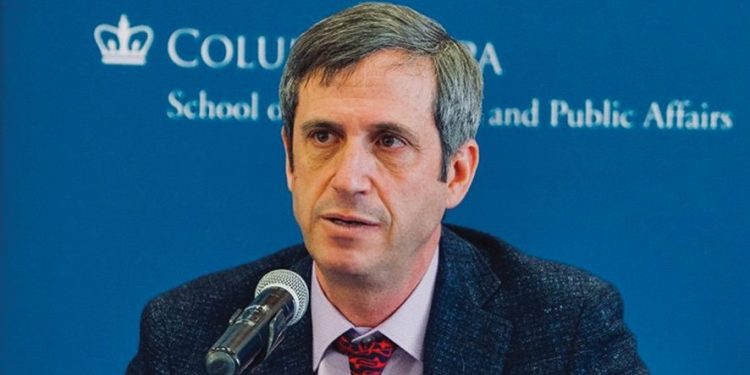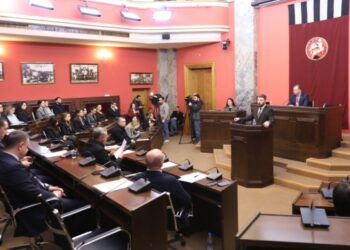Lincoln Mitchell* has not been to Georgia since the spring of 2022, and says he would love to get back. Radio Free Europe/RL’s Georgian Service sat down with him to discuss his reasons for going quiet on Georgia, Bidzina’s latest chess moves, and Kobakhidze as the new PM.
“I still follow Georgian politics and events closely, but, for some good reasons, and some not so good reasons, there’s not a lot of interest in what I have to say,” he tells us. “I think a lot of people who follow Georgia have very short memories. Additionally, I was critical of the Georgian Dream, which means I was no longer useful to them. And there remain a lot of people in Washington who want to tell themselves a story about Georgia and politics that begins with “the UNM essentially made a few mistakes, but was basically good, pro-Western, committed to democracy, and it was ousted by something that felt like a coup in 2012,” – that is still a pretty popular frame in Washington. And if that is your own understanding of Georgia and politics, the last person you want to hear from is me. Because not only do I disagree, I have the receipts, I know what happened. If you want someone to write puff pieces for the Georgian Dream, I’m not your guy. And I’m not saying that as ‘Oh, poor me, Lincoln Mitchell’- I’ve got a lot of friends, I make a good living. I teach classes, I’m very happy.”
Back then, you were considered sympathetic towards GD, and many went as far as to call you Bidzina’s “pocket expert.” Was that reputation unfair?
What justified that is that, unlike many Western analysts, I was never Misha’s guy. I was the first western scholar to be critical of Saakashvili. And whereas most American experts for much of the Saakashvili period into the early Georgian Dream [GD] period could be essentially depended upon to largely tout the UNM line, I was never that person. I’m not going to sit here and tell you that Bidzina has delivered democracy to Georgia, that simply hasn’t happened. I believe that in 2012, Bidzina, with GD’s victory, stopped Misha from consolidating what was moving towards an authoritarian regime. And if that opinion, which I never concealed, made people think I was in Bidzina’s pocket, well, I say what I believe to be true, and people can take it how they want. I’m a big boy, I’ve been called a lot worse.
Bidzina promised to usher in democracy back in 2012. What’s the reason it didn’t happen?
Unfortunately, what happens in Georgia is cyclical: There’s this moment of democratic hope, and it’s followed by the failure to consolidate, and then the regime moves towards being less democratic so as to stay in power. The mystery about Bidzina and the Georgian Dream is how they managed to stay in power this long, and we can get to that later. But part of it is that creating, bringing up, strengthening democracy is much more difficult than people realize. Part of it is that both the leadership of GD and the leadership of the UNM tell themselves a story which is not true, that Georgian democracy, and sovereignty and survival, is dependent “only on us, nobody else.” Once you believe you’re indispensable, you’re giving yourself license to do anything, including to repress any opposition. And on top of it for the Georgian Dream, there is deep personal disdain for primarily Saakashvili, but generally for UNM leadership. In the elections, this works two ways. One, they win the elections, because most Georgian people share that disdain, an idea that is not widely understood in the West, but also that disdain makes them cautious about democracy, because they’re afraid of the other side coming back to power. If Misha ever gets back into power, Bidzina is going to have to flee the country. Some of his people would end up in jail, some will have to flee too, and then the cycle will begin again. Both of the two earlier cycles, the Rose Revolution and Georgian Dream’s victory in the 2012 elections, were seen as the onset of democracy – in my view, it merely showed that democracy was possible, which is something different than saying it’s arrived.
In both cases, the regime was defeated by a broad opposition coalition. And such a coalition has not emerged in Georgia since. One, because the UNM is the number two party, which is not the way you’re going to defeat the Georgian Dream. GD don’t want a coalition to emerge that could defeat them, yet nor does the UNM want that coalition to emerge, because if a coalition emerges, led by somebody other than the UNM, then they will never get back into power.
Do you see a coalition emerging?
The message of Georgian Dream, if you peel away all of the “Misha will come back”, is “we’ve slowly improved the economy. We’ve gotten out of your life a bit, but we’re not going crazy with liberal Western ideas,” which I think most Georgian voters aren’t all that comfortable with, but there’s no war with Russia and most Georgian voters are okay with that.
The UNM says to voters in Georgia, “Listen, Bidzina is calling all the shots.” I would assume most voters would say, “Yes, that’s true. So what?” “Bidzina is a little too close to Russia,” they might say, but these are the issues that elites care about, those in the West.
Yes, everyone knows that the regime has become less democratic, and there is abuse and corruption, beatings of opposition members. However, while people may not like it, they’re not going to roll the dice on uncertainty, as long as they have Georgia more stable, with an economic curve in the right direction.
If we look at Georgia on the map, a few 100 miles to the west, there’s this horrible war in Ukraine; a few 100 miles to the south, there’s an even worse war in Gaza. If you’re in Georgia, you’re looking to the south and you’re looking to the west, and you say, “You know what? We’re doing okay, here.” And that’s a more powerful message than anybody in Washington can offer, particularly because the people who tend to care about Georgia overlap very heavily with the people who are very pro Ukraine, and I would put myself in both those camps.
If the Georgian Dream has such a winning card in hand, how do you beat it?
The way you beat them is by breaking with the UNM. That’s the only hope here: You cast the UNM away and then you chip away at the Georgian Dream’s support base by offering the voter the promise that you will serve as a check factor on the Georgian Dream excesses. Not because we have a totally different vision for the country, but because it is valuable for Georgia to have an opposition voice in parliament that is not all about Misha. And if that party or that coalition or that block comes in second, now you have what we used to call a one and a half party system. Japan has that, Israel had that for the first two decades, three decades of its existence, that changed. But if you say we need radical change, Misha’s talk of revolution was about as good a commercial for the Georgian Dream as they could have come up with, if they could have hired all the best political consults in the world.
The danger of a one and a half party system would be that GD would try to subvert that other opposition party and would likely succeed, because they will have no fundamental differences.
Even if it didn’t succeed, people would think it had, right? The worst outcome for the UNM is for Georgian Dream to win. And the worst outcome for Georgian Dream is to not win, and the best way to ensure that is to make the UNM the second party. But we are now more than a decade into this. That’s what’s so surprising. The UNM has dug in on this, and many in the West have enabled that.
On to Ivanishvili and his third entrance into politics. Questions can be asked both regarding the reason for that return and the timing.
I don’t really consider it a return, because I’m reminded of the old country song: How can I miss you if you won’t go away? You can’t return to something you never left. Since 2012, Bidzina, regardless of the role, has been the prime mover of Georgian politics, and the prime mover of the Georgian Dream party.
Coming back to take on a formal role now is about timing – he wanted to get in on an election year. The shake up with the Prime Minister and Kobakhidze is something he wanted, and he wanted to do with it well in advance of the October election.
He thrice, much like biblical Peter, renounced the idea of replacing the prime minister. three times he denied that it was on the cards, and yet, one month after his return, it’s done.
Many things Bidzina does are baffling. My sense on Bidzina is that he’s a good strategic thinker, but he’s not a good political thinker. He understands strategy. He can think many moves down on the chessboard, but he doesn’t understand politics and communication. So I’m sure part of what he thought is that nobody really cares that he said he wouldn’t do it and then he did.
There’s also the question why he would replace Garibashvili with Kobakhidze, who is more disliked than Garibashvili. It’s a strange move. One thing not reported much is the extent to which it’s difficult to get access to Bidzina, so the question of who’s been whispering into Bidzina’s ear for the last month is a massively important one, which most Georgians and certainly most outsiders who are trying to understand the situation don’t know. For all we know, there was a whispering campaign that Kobakhidze wanted to be the Prime Minister, and that Garibashvili was tired and the public needed a fresh face.
There is no rational strategic reason for it. It is taking a guy who’s unpopular with the voters and replacing him with a guy who’s even less popular with the voters. Especially considering Garibashvili is extremely loyal to Bidzina, which is a very prized quality for Bidzina, even more loyal than Kobakhidze, in my subjective opinion. But I think he felt like Garibashvili had just been in there too long and they needed a fresh face, wanted to show some changes. Also, Garibashvili has been through this once, he knows the game and its rules, and Bidzina knows that he is a team player, he can be relied upon. He may well come back again. His life has been transformed by his relationship with Bidzina, he is too smart to jeopardize that, and he understands that he doesn’t serve the Georgian people- he serves Bidzina.
They have, in Bidzina’s view, started the year hitting the ground running with this, making it difficult to attack him as a “behind the scenes mastermind.” I suspect Bidzina believes, as he has for some time, that he is the best public face for Georgian Dream.
Why do you doubt he’s the best public face for the Dream?
I don’t believe Bidzina’s instincts are as strong as he might think. And I don’t know whether the Georgian voters see him as this extremely powerful and fundamentally benevolent, super rich guy, or they see him as part of the problem.
What’s the legacy Garibashvili leaves behind him, and what have we to look forward to when it comes to Kobakhidze?
Garibashvili’s biggest legacy, this time round, is the relationship with Russia. The major thing that happened during his tenure was the war in Ukraine, and he steered the state through that in a way that I am sure pleased some people, displeased many others, but he’s the guy who oversaw the war, so to say. As for Kobakhidze, his mission will be to win the election, full stop. I don’t see this swap as signifying any change in the big picture policy for Georgia. Georgia, like every small country, particularly in this part of the world, is going to find it increasingly difficult to navigate between Moscow, Beijing, Turkey, the Arab world and the West, and it is not clear to me that the Georgian government, the current team, are really focusing on that challenge.
* * *
*Lincoln Mitchell is a political analyst, pundit and writer based in New York City and San Francisco. Lincoln works on democracy and governance related issues in the former Soviet Union, Eastern Europe, the Caribbean, the Middle East, Africa and Asia.
Interview by Vazha Tavberidze














